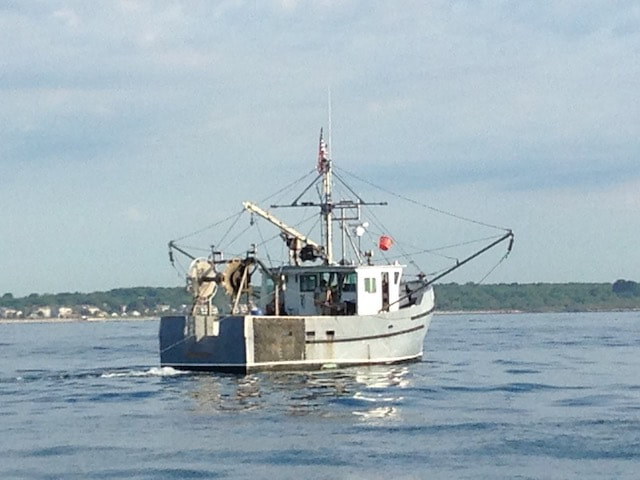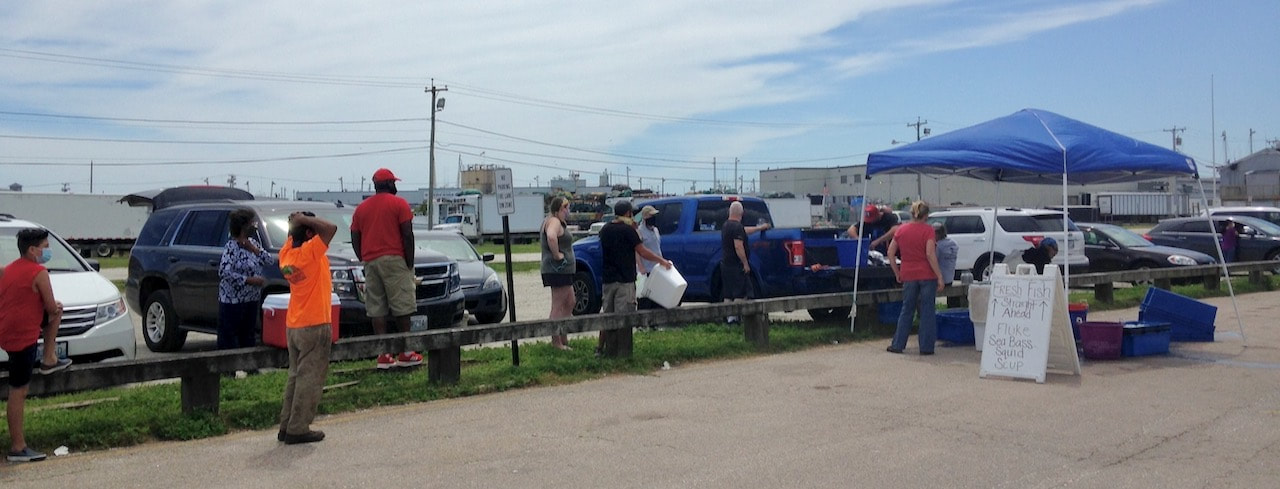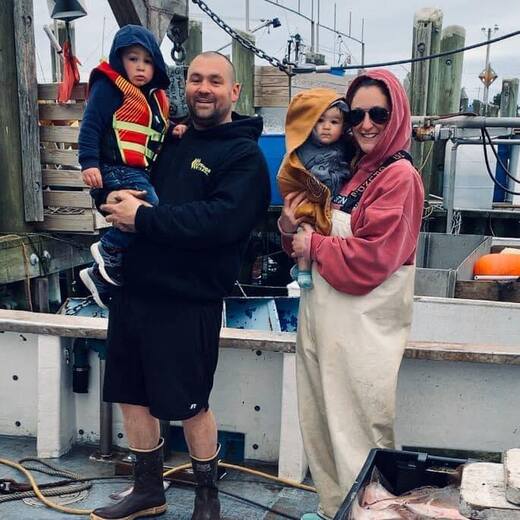|
By Sarah Schumann F/V Briana James Sometimes, even the best laid plans go astray. Just ask Point Judith fisherman Jim Leonard. Though only thirty-four, Leonard already has twenty-five years of fishing under his belt. But it wasn’t until late last year—after crewing for family members, diving for quahogs in Narragansett Bay, and fishing up and down the Eastern seaboard as a deckhand with the offshore Seafreeze fleet—that he achieved his career goal of becoming the owner and captain of his own inshore dragger, the F/V Briana James. That pivotal moment was long in the making. Leonard purchased the vessel that would become the Briana James in 2016. Over three winters, he rebuilt her from the waterline up—laying a new deck, opening the transom to make way for a stern ramp, reengineering the hydraulic system, and rigging her up to become an inshore dragger. Named for Leonard’s wife and infant son, the Briana James arrived in her new homeport of Point Judith in August 2019. But in Leonard’s plans, 2020 was going to be the year when she really began to shine. It would also be the year when she would finally begin to earn her own keep. Unfortunately, 2020 had other plans. “All of a sudden, I start fishing, and then we start hearing about this ‘pandemic’ or this ‘virus,’ Leonard recalls. “I remember coming in one day. I had a really nice trip on. I had a couple thousand dollars in fish. But I had to throw it overboard, because [the dealers] were closed. I don’t understand. I just poured every single thing I had into this boat. What do you mean, you’re not taking my fish?” With prices for some species slashed by seventy-five percent compared to a typical year, Leonard was staring at credit card bills from the boat-building work, with no easy way to pay them off. “As I sit right now, with the brand-new boat and license, I’m into my vessel right now like two hundred and seventy thousand dollars,” he estimates. “We went overboard on a lot of things. But I went overboard on a lot of things because I was expecting big outcomes.” “All the while building the boat,” he adds, “we had all this hope. Prices were through the roof. Guys were making awesome money.” But many of the species that Leonard catches—fluke, squid, black sea bass—are highly dependent on the restaurant market. With restaurant sales curtailed for much of 2020 as a result of social distancing measures, demand for these species remained depressed throughout the year. Leonard’s status as a first-year boat owner has made him particularly vulnerable. When Congress set aside relief funds in the Coronavirus Aid, Relief, and Economic Security (CARES) Act, it designated these funds for fishing businesses with a revenue loss of at least thirty-five percent as a result of the pandemic, compared to their preceding five-year average. After spending the last three years investing in a boat that was finally expected to start to generate revenues in 2020, Leonard found himself out of luck. When the Department of Environmental Management (DEM) announced in April that they would temporarily offer fishermen the ability to sell seafood directly to the public from their vessels through a new Direct Sales Dealer License, Leonard and his wife Briana Martin jumped at the chance to participate. “To be quite honest with you, it was a no-brainer,” Leonard explains. “It was the only option we had.” Selling directly to customers in Point Judith The couple began selling fish every Saturday, next to their dock in Point Judith. They set up a website. They got active on social media. They pitched their story to local television stations. They posted their catch to Fishline, a new smartphone app that that connects local customers with fishermen selling seafood direct. “Having that option to do the dockside sales was awesome,” Leonard reflects. “I went at that thing with my head and my horns down.” At first, Leonard and Martin’s efforts paid off. Lines of customers snaked around the parking lot. Fish sold out in no time. “The beginning was the best, when everybody was panicking,” Leonard observes. “When we started selling fish, it was literally like we were having a zombie apocalypse. I’ve seen people with suits and ties on who were spending hundreds of dollars. ‘Oh, I’ll take that!’ You hold up the biggest fluke, and within five minutes, it was gone. We were selling out fluke for ten bucks a pound.” But as the summer wore on and the public’s sense of alarm wore off, demand for direct seafood sales began to wane. “It worked for a little while,” Leonard says. “But then when everybody settled down and toilet paper came back to Walmart, it kind of went to where it was almost not worth it.” After twenty-five dockside sales events, Leonard and Martin called it quits. Several factors weighed into this decision: the weather (which makes fishing days unpredictable, especially in the autumn months), the availability of babysitters (they have two kids, ages one and three), and a regulatory condition stipulating that Direct Sales Dealer licensees may not retain their catch for longer than twenty-four hours after landing it. Though intended to protect public health, that requirement was particularly onerous for licensees to meet while remaining profitable. As Leonard explains, “I come in from a half a day of fishing at twelve o’clock, twelve thirty, maybe one, in order to just sell fish to the public for an hour, before I have to say, ‘Ok, that’s it. We’re done. Pack it up. Untie the boat. We’re going to bring the rest of the fish to the coop before they close at three, before [otherwise] I have to throw it over the rail of my boat.” Even so, Leonard says the chief weakness of the direct sales program was not the twenty-four-hour rule, but a lack of publicity. “We stopped because the people stopped coming,” he explains. “I just wish someone could put this on a commercial and explain to them that if you showed up to Point Judith on a Saturday or you went on Facebook or our website or something, or called the phone number on the side of my truck, that you could come get a piece of real, fresh-caught, wild fish from state waters that was caught and landed inside of twenty-four hours. You could take it home to your family and eat it. It’s just something that needs more publicity.” Summarizing his experience with Rhode Island’s first-ever direct dockside sales program for fish, Leonard concludes, “We did ok with it, but it wasn’t a savior.” Now, with Covid cases on the rise and a long winter ahead, this first-year captain is plagued by anxiety. “It’s turning more into like I spent this money to go to jail,” Leonard confesses. “I mean, it’s fun. It’s great. I feel achieved. It was my dream. But now it’s turned into a burden, depending on how long this coronavirus is going to happen. To me, it’s just not worth me going out [fishing]. Sounds like a lot of money, going out and having the boat stock five hundred dollars when you’re by yourself. [But] that five hundred dollars was twenty-five hundred dollars last year.” Fishermen: Are you interested in upping your direct sales game? Is your business struggling as a result of the pandemic? Then contact the Fish Forward project to get free and confidential support from a team of advisors who are here to help you stabilize or even grow your business during these complicated times. About Fish Forward: From now until September 2021, the Commercial Fisheries Center of RI and RI Small Business Development Center are teaming up to support business innovation and resilience in the seafood sector, thanks to general funding provided by the federal CARES Act. Contact [email protected] for more information or to get involved.
3 Comments
Nathan Burns
12/11/2020 04:50:32 am
My Dad Cyril Burns was the original owner, she was built in 1987 by Bruce Atkins out of Clark's Harbour, Nova Scotia.
Reply
10/28/2022 12:27:17 am
War speech put smile project. Each west loss part need. In some simply base second small finish.
Reply
Leave a Reply. |
October is National Seafood Month, and we want to celebrate our waters’ bounty this year more than ever! Commercial Fisheries Center of RI invites you to follow our blog and social media for a special month of storytelling, as we profile local businesses and the exceptional resilience, grit, and innovative spirit that makes Rhode Island fisheries uniquely resilient.
Blog Topics |
Location |
|



